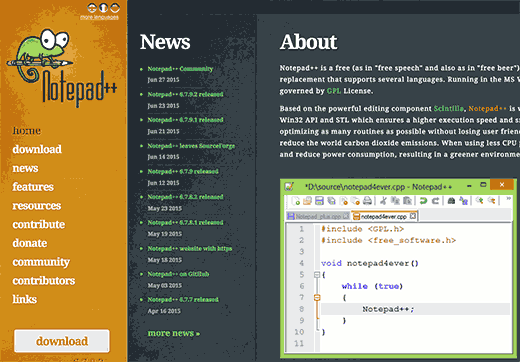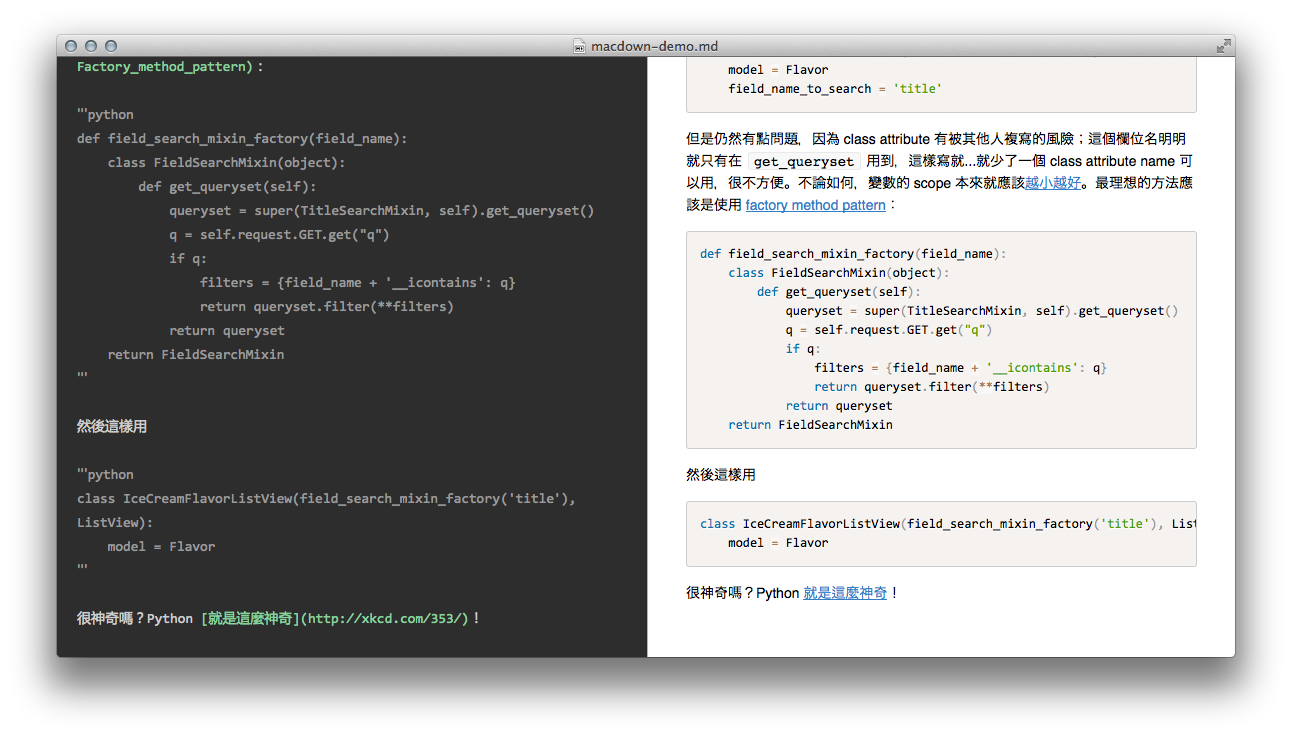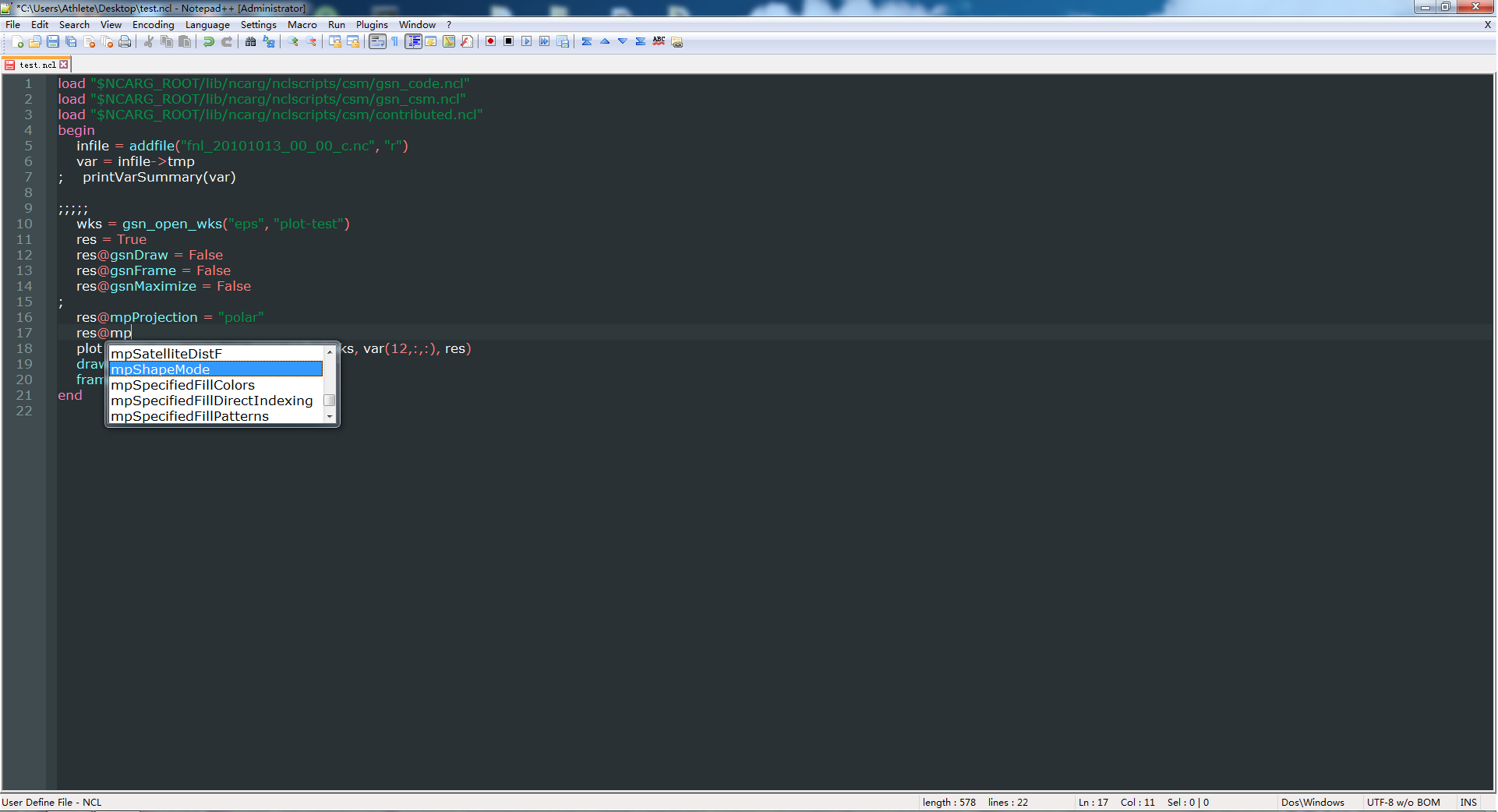A good word processor is one of the few pieces of software you simply can't live without. You might be able to manage without a spreadsheet tool or something for making slideshows, but text documents are unavoidable. Thankfully, you don't need to splash out on a full Microsoft Office subscription; there are some superb word processors available to download and use completely free.
Here we’re looking at the very best word processors that can be used offline (particularly useful for distraction-free writing), but there are also several excellent browser-based tools to consider if you'd rather do your writing online.
Finding the right HTML editor for the Mac doesn't mean spending a lot. It is primarily a code editor, not specifically a web editor. Download Notepad++ source code of current version and/or check sha1/md5 digests for binary packages on GitHub Notepad++ v7.6 new feature & bug-fixes Add Built-in Plugins Admins. The Best Programming Text Editor for Mac. 7/05/11 1:30pm. Note: This feature list is borrowed from the TextMate site and the links will take you directly to TextMate's pages.
Google Docs is the most obvious choice, and has the advantage of saving your work automatically so you don’t have to worry if your connection fails. It’s also a good choice for collaborative working, and means you don’t have to upload work to a separate cloud storage service. However, it has a limited selection of templates, there’s no way to import content from other Google applications, and any online tool is going to be surrounded by distractions like social media.
If you'd prefer an offline word processor, read on – the perfect one is only a click away.
1. WPS Office Free
A word processor with cloud storage and support for all text files
If you’ve used a modern version of Microsoft Word, there’ll be no learning curve when you switch to Writer – the word processing component of WPS Office Free.
This free word processor looks and behaves almost exactly like its premium counterpart, and even has its own equivalent of OneDrive, offering 1GB free cloud storage.
Its selection of pre-installed templates gives you everything you need for common document types, and you can easily create your own for bespoke tasks. It’s compatible with every text file format you can think of, including current and legacy versions of Microsoft Word dating back to Office 97.
WPS Office Writer is supported by discrete ads, which can be removed by upgrading to the premium version, but they’re barely noticeable and no features are locked behind a paywall. Overall, WPS Writer is very impressive, and in our opinion it’s the best free word processor available to download today.
WPS recently launched a free PDF to Word converter as well, which is a great companion to its word processor.
2. LibreOffice or Apache OpenOffice
All-singing, all-dancing word processors for any text-based work
LibreOffice is a fork of Apache OpenOffice, and although there are some differences between the two suites (LibreOffice receives more frequent updates, for example, and has a more lively userbase), their word processing components are so similar, we’re listing them together.
Both versions of Writer are feature-packed analogs of Microsoft Word, packed with all the features you could possibly need for any text-based work.
The two versions of Writer include wizards and templates for common document types, such as invoices and letters, and it’s easy to create your own templates for future use as well. The word processors also work together with the other office software in their respective suites – so you can use Base to create a bibliography, for example.
Both word processors support all the most popular file formats, and can export documents to PDF without the need for additional software. If you’re looking for a word processor that can stand in for Microsoft Word, either of these two will be a perfect candidate.
3. FocusWriter
The ideal word processor for first drafts, with no fussy formatting
If you simply want to hammer out some words without worrying about formatting, you could just use Windows’ built-in Notepad app, but FocusWriter is full of clever tools that will help you maximize productivity without ever getting in the way.
As the name implies, FocusWriter blocks out all distractions so you can give that all-important first draft your full attention. In normal use, all you see is a blank page – toolbars are only visible if you move your mouse pointer to the edge of the screen – but there’s a killer feature in Focused Text, which fades everything into the background except the current paragraph or sentence.
FocusWriter also features alerts that are triggered at certain times, or when you’ve reached a predefined word count, so you don’t need to worry about watching a counter (as you would in Microsoft Word). This also makes FocusWriter a good tool to use in tandem with the Pomodoro Technique, which involves working hard for a period of time that’s long enough for you to work productively, but not so long that you become fatigued.
It’s not suitable for editing, but for productivity, FocusWriter is hard to beat.
4. SoftMaker FreeOffice
Another great looking word processor, but watch your file formats
TextMaker – the word processing element of SoftMaker FreeOffice – is good looking, and comes with several handy templates for creating letters and other everyday documents. The selection isn’t as extensive as some of its rivals’, but you can also make new designs for future use and save them in TMV format.
All the features you’d expect from a modern word processor are present and correct, including advanced formatting options, the ability to create databases for managing bibliographies and footnotes, and a function for tracking changes to collaborative projects.
The only real drawback of TextMaker is its inability to save your work in DOCX format (though you can open and edit these files with no difficulty). This feature is limited to the premium version of SoftMaker Office, which retails for £48.20 (about US$60, AU$75).
5. Writemonkey
Productivity-focused word processing with quick shortcuts
WriteMonkey is another no-frills word processor designed to help you maximize your output without fussing with editing and formatting. It’s not intended for documents like letters or CVs, but is great for committing early ideas to paper (or screen) so you have the raw material to develop later.
Unlike FocusWriter, which is compatible with all the most common text formats (including Microsoft’s DOC and DOCX), WriteMonkey only works with TXT files, so you’ll have to convert any works in progress before opening them. WriteMonkey’s hidden controls are tricker to navigate, too – everything is accessed via a large right-click menu, or a vast collection of keyboard shortcuts.
That said, if you’re happy to commit those shortcuts to memory, you’ll find WriteMonkey faster to use than toolbar-based alternatives.
We also like the ability to look words up in Wikipedia, Google Images, Poetry.com, Answers.com, and many others without opening a browser winder manually and leaving yourself open to the temptations of Twitter and Facebook.
WriteMonkey is a portable app, so there’s no need to install it – just extract all the downloaded files to a removable drive or cloud storage service and fire it up by running the file WriteMonkey.exe.
This article has been updated as of September 2019 to ensure that all the HTML editors listed are still available for free download. Any new information on latest versions has been added to this list.
During the original testing process, over 100 HTML editors for Windows were evaluated against more than 40 different criteria relevant to both professional and beginning web designers and web developers, as well as small business owners. From that testing, ten HTML editors that stood above the rest were selected. Best of all, all of these editors also happen to be free!
NotePad ++
What We Like
Small download and program size.
Loads fast, and runs light.
Auto-completion for words and functions.
Plugin options to extend functionality.
What We Don't Like
No Mac version available.
May be less useful for languages like Java.
Notepad++ is a favorite free note taking app and code editor. It is a more robust version of the Notepad software that you would find available in Windows by default. That being the case, this is a Windows-only option. It includes things like line number, color coding, hints, and other helpful tools that the standard Notepad application does not have. These additions make Notepad++ an ideal choice for web designers and front end developers.
Komodo Edit
What We Like
Extensible through plugins.
Customizable appearance.
Available for Windows, Mac, and Linux.
What We Don't Like
No WYSIWYG editor.
Not the best editor for beginners.
There are two versions of Komodo available, Komodo Edit and Komodo IDE.
is open source and free to download. It is a trimmed down counterpart to IDE.
Komodo Edit includes a lot of great features for HTML and CSS development. Additionally, you can get extensions to add language support or other helpful features, like special characters.
Komodo doesn't outshine as the best HTML editor, but it's great for for the price, especially if you build in XML where it truly excels. I use Komodo Edit every day for my work in XML, and I use it a lot for basic HTML editing as well. This is one editor I'd be lost without.
Eclipse
What We Like
Plugin design makes adding new languages simple.
Open source with large community makes problem solving easier.
Runs on multiple platforms such as Windows, Mac, and Linux
What We Don't Like
A large program that's not as light as other editors.
Consumes considerable system resources, especially on large projects.

Eclipse is a complex development environment that is perfect for people who do a lot of coding on various platforms and with different languages. It is structured as plug-ins, so if you need to edit something you just find the appropriate plug-in and go to work.
If you are creating complex web applications, Eclipse has a lot of features to help make your application easier to build. There are Java, JavaScript, and PHP plugins, as well as a plugin for mobile developers.
Aptana Studio 3
What We Like
Good for JavaScript.
Multiplatform support (Windows, Mac, Linux).
Plugins expand supported languages.
What We Don't Like
Lack of updates and announcements since 2014.
Bulkier and sometimes slower than some other editors.
Aptana Studio 3 offers an interesting take on webpage development. Instead of focusing on HTML, Aptana focuses on JavaScript and other elements that allow you to create rich internet applications. That may not make it the best fit for simple web design needs, but if you are looking more in the way of web application development, the tools offered in Aptana may be a great fit.
One concern about Aptana is the lack of updates that the company has done over the past few years. Their website, as well as their Facebook and Twitter pages, announce the release of version 3.6.0 on July 31, 2014, but there have been no announcements since that time.
While the software itself tested great during initial research (and it was originally placed 2nd in this list), this lack of current updates must be taken into consideration.
NetBeans
What We Like
Version control functionality.
Customizable appearance.
Specialized for Java.
What We Don't Like
Takes some time to learn.
Consumes a lot of system resources while running.
Can be slow to execute commands.
NetBeans IDE is a Java IDE that can help you build robust web applications.
Like most IDEs, it has a steep learning curve because it doesn't often work in the same way that web editors work. Once you get used to it you’ll find it very useful, however.

The version control feature included in the IDE is especially useful for people working in large development environments, as is the developer collaboration features. If you write Java and webpages this is a great tool.
Microsoft Visual Studio Community

What We Like
Well supported with updates and the addition of new features.
Wide range of programming languages supported.
Nice design that is beginner-friendly.
What We Don't Like
Premium features come with high price tag.
Heavy program that consumes significant memory and processing power.
Bit of a learning curve for new users.
Microsoft Visual Studio Community is a visual IDE to help web developers and other programmers get started creating applications for the web, mobile devices and the desktop. Previously, you may have used Visual Studio Express, but this is the latest version of the software. They offer a free download, as well as paid versions (that include free trials) for Professional and Enterprise users.
BlueGriffon
What We Like
Multiplatform support (Windows, Mac, Linux).
WYSIWYG editor with previews.
Good for beginners
What We Don't Like
Can suffer lag during use.
Lots of options may bewilder new users.
BlueGriffon is the latest in the series of webpage editors that started with Nvu, progressed to Kompozer and now culminates in BlueGriffon. It is powered by Gecko, the rending engine of Firefox, so it does a great job of showing how work would be rendered in that standards-compliant browser.
BlueGriffon is available for Windows, Macintosh and Linux and in a variety of languages.
This is the only true WYSIWYG editor that made this list, and as such it will be more appealing for many beginners and small business owners who want a more visual way to work as opposed to a purely code-focused interface.
Bluefish
What We Like
A fast and lightweight program.
Multiplatform support (Windows, Mac, Linux).
What We Don't Like
Primarily a code editor without a WYSIWYG interface.
Lacks an easy FTP upload feature.
Bluefish is a full-featured HTML editor that runs on a variety of platforms, including Linux, MacOS-X, Windows, and more.
Best Code Editor For Mac
The latest release (which is 2.2.10 or 2.2.10-2 for High Sierra) fixed some of the bugs found in previous versions.
Noteworthy features that have been in place since the 2.0 version are code-sensitive spell check, auto complete of many different languages (HTML, PHP, CSS, etc.), snippets, project management and autosave.
Code Editor For Mac Notes
Bluefish is primarily a code editor, not specifically a web editor. This means that it has a lot of flexibility for web developers writing in more than just HTML, however, if you’re a designer by nature and you want more of a web-focused or a WYSIWYG interface, Bluefish may not be for you.
Photo Editor For Mac
GNU Emacs Profile
What We Like
Included with most Linux systems.
Powerful with plenty of features.
What We Don't Like
More complicated than other editors.
Not the best choice for beginners.
GNU Emacs is found on most Linux systems and makes it easy for you to edit a page even if you don't have your standard software.
Emacs is a lot more complicated some other editors, and so offers more features, but I find it harder to use.
Text Editor For Mac
Feature highlights: XML support, scripting support, advanced CSS support and a built-in validator, as well as color coded HTML editing.
This editor, whose latest version is 26.1 which was released in May 2018, can be intimidating to anyone who isn't comfortable writing plain HTML in a text editor, but if you are and your host offers Emacs, it is a very powerful tool.